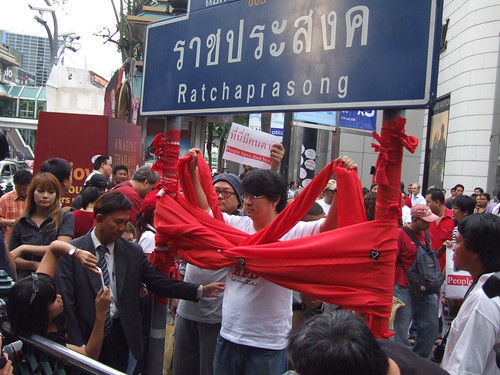Sombat Boon-ngam-anong, leader of the Red Sunday Group, presented his idea of petitioning the Constitution Court for its removal to a crowd of red shirts gathered in front of the Criminal Court on 8 July.
He reasoned that if the court were to rule against the proposed constitutional amendments, its action would be tantamount to overthrowing the political system as it would end the sovereignty of the legislative branch.
He urged those who disagreed with the court’s anticipated ruling to come out to stand in line in front of the court and each file her or his own complaint.
The activist was speaking to about 100 red shirts who gathered on the footpath in front of the Criminal Court, where a public forum has been held every Sunday for a few months now in their campaign to free political prisoners.
He argued that a similar Constitution Drafting Assembly had been set up several times before, for example, in 1974, 1997 and 2007.
He suggested that the red shirts adopt a political fight instead of a military one, because it would not lead to loss of life. And this would be inclusive, regardless of gender and age, while a military fight requires those involved to be youthful, armed and trained.
In his view, he said that many of the red shirts had been ferocious in the past, and it was understandable as they had been ‘subject to abuse’ all along. In the past couple of years, however, they seem to have been calmer. Nevertheless, they should continue to seek information and learn to be tolerant and rational.
He has seen some development among them along these lines, as ‘now the red shirts are starting not to listen to what their leaders have to say in their rally speeches, because they know what the leaders are up to, and they have packed rooms for academic discussions.’
He said that although fighting with reason might not necessarily lead to victory over your opponents, other people might listen and judge for themselves as to which side was more reasonable.
He also suggested that the red shirts organize themselves in small groups of about 10-15 people in their neighbourhood, to have discussions and learn from one another.
However he criticized about 80-90% of the red shirts he had met for being too obsessed with reviling their opponents, and hardly being aware of what they could contribute to their cause in their own capacities.
He shared his experience of his ‘symbolic fights’, credited for revitalizing the red-shirt movement after the government crackdown in 2010.
He said that he would consider ‘low-cost methods but with high impact’. For example, a few months after the crackdown, when the red shirts were in low spirits, he organized an activity of tying pieces of red cloth at the Ratchaprasong intersection, at a cost of only 350 baht for 10 metres of cloth. He had asked those who wanted to come to join the activity to bring their own pieces of red cloth. In subsequent weeks, more and more people came out to join him until the police had to remove the intersection sign.

He urged the red shirts to be open to learning lessons and listening to criticism.

